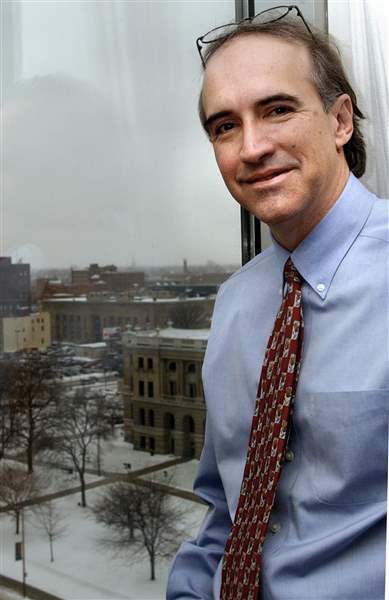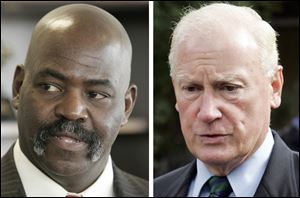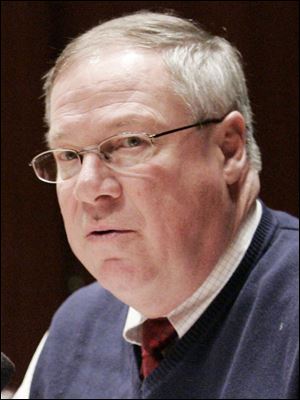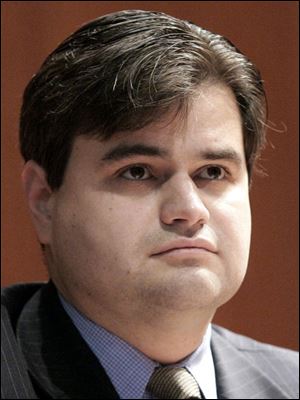
Repeated failure to act leaves city of Toledo on the brink
3/28/2010
‘Governments that won't make tough choices will crumble,' Mike Beazley, longtime local politico, says.
Diane Hires / Blade

‘Governments that won't make tough choices will crumble,' Mike Beazley, longtime local politico, says.
All Toledo City Council has to do to fill the city's $25 million budget hole by Wednesday is raise taxes and garbage fees and either impose contract concessions on city unions or back the mayor's plan to lay off 125 police officers.
Sounds simple enough. After all, what politician wouldn't want to raise taxes during a recession and jeopardize public safety?
With a struggling local economy and a dwindling tax base, local governments must have the political will either to raise revenues or cut costs. As longtime local politico Mike Beazley told The Blade: “Governments that won't make either of those choices will crumble.”
With the state-set deadline of March 31 for passing a balanced budget fast approaching, it would seem Toledo is beginning to crack.
Mayor Mike Bell has asked council to raise the trash collection fee to $15 a month, impose an 8 percent events tax, and eliminate the income tax credit for thousands of Toledoans working outside the city to raise about $19 million in revenue.
To make up for the remaining $6 million, the mayor wanted minimal concessions on pension costs from the city's bargaining units to avoid widespread layoffs. While the Toledo Police Patrolman's Association voted last week to reject those concessions, Toledo Firefighters Local 92 accepted the cuts to avoid layoffs.

Both the current mayor, Mike Bell, left, and his predecessor, Carty Finkbeiner, were unable to reach agreement with City Council on raising revenues. That has put Toledo in the position of having to make grim choices now.
So City Council is left with either imposing concessions on police in the face of a fiscal emergency or approving the layoff of 125 police officers at a time when crime in the city is on the rise.
The city has endured a year of inaction on proposals by former Mayor Carty Finkbeiner and Mr. Bell to raise revenues. If it seems council is slow or simply unwilling to act on the options before it, it's because those options come with real-life consequences for city residents, let alone council members' own political careers.
But it's also that same failure to act — not only by the current city council but past councils, past mayors, and to an extent the Bell administration — that has put Toledo in the position to make such grim choices now.
For every day that the current spending level is allowed to continue in the city, budget scenarios become worse and corrective measures become more drastic.
The city's tax revenue dropped by $15 million from 2007 to 2008 (to $154.5 million) and dropped by another $13 million from 2008 to 2009 (to $141.5 million) as the local and national economies imploded.
Last year, Mr. Finkbeiner negotiated — and council approved — new union contracts with police and fire personnel that the city could not afford.
Those contracts called for the city to resume picking up the 10 percent employee portion of pension costs in 2010 after a six-month freeze — on top of the employer's contribution of 19.5 percent — and deferred huge overtime payouts to March 1. For these minimal concessions, police and fire unions bargained additional vacation days and a 3.5 percent raise on Jan. 1, 2011.
![Repeated-failure-to-act-leaves-city-of-Toledo-on-the-brink-3.jpg ‘Council members who voted for those [police and fire] contracts need to do a better job,' Councilman Tom Waniewski, a Republican, says.](/image/2010/03/28/300x_b1a4-3_cCM/Repeated-failure-to-act-leaves-city-of-Toledo-on-the-brink-3.jpg)
‘Council members who voted for those [police and fire] contracts need to do a better job,' Councilman Tom Waniewski, a Republican, says.
“Council members who voted for those contracts need to do a better job,” said Republican Councilman and Ohio Senate candidate Tom Waniewski, who cast one of the three no votes on the contract with the policemen's union and the lone no vote for the firefighters' contract. “We as a council need to do better. We were shortsighted.”
With the police officers' rejection Thursday night of the concessions Mr. Bell sought, for the first time since his election cracks appeared in his calm demeanor.
He refused to talk to reporters, and when he did comment the next day — after yet another City Council meeting at which no action was taken — his disappointment was evident. “With this council, I am not sure. I used to be hopeful. I am not so hopeful any more,” he said.
He also rebuffed suggestions by the police union that bargaining be continued.
“I can tell you there's no intent to meet with any union representatives this weekend,” he said.
Delaying decisions
The Finkbeiner administration presented its 2010 budget proposal to council in November, predicting a $30 million deficit. Mr. Finkbeiner called for raising the trash fee to $16 a month, eliminating the income tax credit for residents who work outside Toledo, and raising the city's temporary 0.75 percent income tax.

Councilman D. Michael Collins, an independent, says ‘one way or another' City Council will approve a balanced budget this week.
Council could have begun the work of examining Mr. Finkbeiner's proposals and offering counterproposals right away, but there was an obvious reason for delaying such action.
“Frankly, council was awaiting the Bell administration,” said independent Councilman D. Michael Collins, an opponent of Mr. Bell's in the September mayoral primary.
Mr. Bell was elected on promises of transparency and a team-building approach to solve problems, and he has attempted to deliver on those promises. After taking office on Jan. 4, he put together a citizens' task force to study Toledo's budget woes and was open with the public about his suggestions to trim what had been a deficit as high as $48 million.
But those moves came about gradually. Mr. Bell vacationed in San Diego after his Nov. 3 victory over Keith Wilkowski, didn't name Steve Herwat (now his chief deputy) as the director of his transition team until Nov. 18, and didn't hold the first meeting of his public task force to study the budget until Jan. 25.
In a letter dated March 1 — 31 days before a balanced budget was due — Mr. Bell asked council to raise the trash fee, eliminate the tax credit, impose the entertainment tax, and declare “exigent circumstances” to force city union members to make greater pension and health-care payments.
Sharing the pain
Controversial as those proposals were, they came on the heels of the reports in The Blade that some top officials in Mr. Bell's administration had received pay increases as high as 26.9 percent. While Mr. Bell defended the raises as warranted based on the workload of the recipients, it knocked him off his “everyone shares the pain” message that he had adopted to find budget solutions.
And after previously announcing that he wanted all city employees to pay the entire 10 percent portion of their pensions and contribute 20 percent toward their health care, the deals he reached with the police and fire units called for only a 3 percent pension contribution for nine months and the deferment of overtime payments.

Councilman Joe McNamara, a Democrat, says he is unsure a consensus exists on council to pass the measures necessary to reach a balanced budget.
“The mayor and council need to do something that requires real giveback by city employees,” said Jim Ruvolo, a former state and Lucas County Democratic Party chairman. “Council needs to understand that the public wants to see everybody sharing the burden.”
Mr. Bell issued 125 layoff notices to police officers and 125 to firefighters earlier this month, which he rescinded when negotiations began on the concessionary deal that the patrolmen's group rejected last week and firefighters accepted. The mayor could reissue those notices to police as early as tomorrow.
But City Council still needs to act.
Concessions?
If council, citing a financial crisis that city officials say will cause paychecks to bounce this year, declares “exigent circumstances” and imposes the original concessions that Mr. Bell sought, no police will be out of work.
The police union says it will block the imposition of concessions in court and good-faith negotiations in the future will undoubtedly be difficult — two factors that are weighing on council members' minds.
But so is the nightmare scenario of having fewer police patrolling poverty-stricken and crime-ridden neighborhoods. After last year's layoff of 75 police officers by Mr. Finkbeiner, burglaries and home invasions spiked with several elderly residents beaten — including two in North Toledo who died.
Tough choices
Whichever decision council makes regarding the labor contracts the city can no longer afford, it will have to reach into its citizens' pockets. Raising the trash fee in some manner seems inevitable, and the other revenue-raising measures are avoidable only if council quickly finds more ways to cut costs.
Mr. Collins said Friday that “one way or another” a balanced budget will be passed this week. Councilman Joe McNamara, a Democrat who is running for the Ohio Senate, said he wasn't so sure.
“I'm not sure there's a consensus on council” to approve the proposals necessary for balancing the budget, Mr. McNamara said.
If that's truly the case, the city is headed for a declared fiscal emergency, which equates to a near state government takeover.
These are grim scenarios for any politician, but with four members of Toledo City Council running this year for open seats on the Lucas County Board of Commissioners, the Ohio Senate, and Ohio House, the decisions to go to battle with city unions or raise taxes on voters are especially tough.
But tough or not, hard decisions are necessary and they have to come now.
Contact Joe Vardon at:jvardon@theblade.comor 419-724-6559.